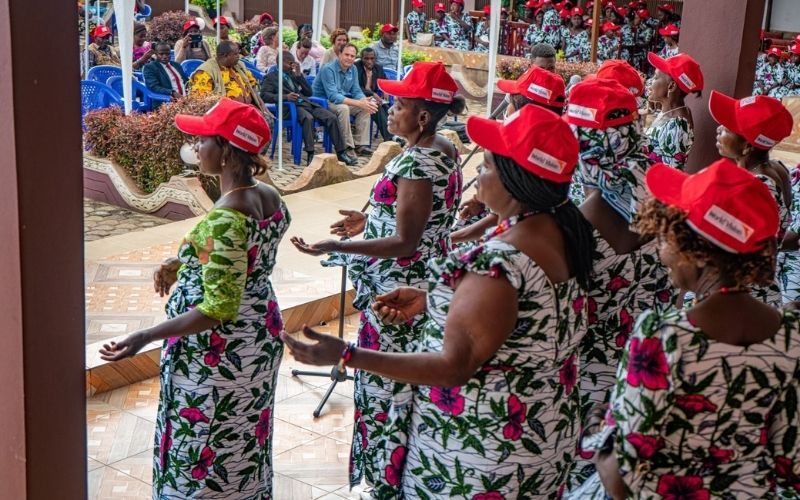Sexual violence against women and girls happens everywhere, but in the eastern Democratic Republic of Congo (DRC), it is often a weapon of war.
“It is used by armed groups and regular forces to punish, dominate and destroy local communities,” says Christine Amisi (“Dr. Tina”) Executive Secretary of the Panzi Hospital in Bukavu, DRC in a new interview with Michael Messenger, President & CEO of World Vision Canada to mark
International Day for the Elimination of Violence against Women.
According to Dr. Tina, an average of 1,152 women are raped every day in the DRC with a terrible impact on individuals, families and entire communities, including mass displacement, the spread of sexually transmitted diseases, increased poverty and the destruction of social cohesion.
Enter the Panzi Hospital located in eastern DRC, founded by Nobel Peace Prize Laureate, Dr. Denis Mukwege. Since opening its doors in 1999, the hospital has treated more than 50,000 survivors of conflict-related sexual violence.
“We realized early on that medical care wasn’t enough to treat survivors,” says Dr. Tina. “We take a holistic approach that combines medical health, psychological and socio-economic support.”
This holistic approach includes the innovative Healing in Harmony (HiH) therapeutic music programme developed by the Canadian organization Make Music Matter. HiH helps heal emotional wounds that can last a lifetime by pairing survivors of violence with a professional therapist and music producer to unlock trauma from deep within the brain. By writing, creating and performing songs about their experiences, these survivors become empowered artists and community members.
“The negative perception of trauma is replaced by positive perception,” Dr. Tina says of the Healing in Harmony approach “It gives them a sense of recognition and stabilizes their emotions. It changes their sadness to joy.”
 “Ester” (foreground), a survivor of sexual violence and a Healing in Harmony participant, performs at a public concert that promotes recognition and reduces stigma in the community. “Hearing those powerful songs of healing and reconciliation was incredibly impactful,” says Michael Messenger, President & CEO of World Vision Canada (background). Beni, DRC. Photo: Brett Tarver
“Ester” (foreground), a survivor of sexual violence and a Healing in Harmony participant, performs at a public concert that promotes recognition and reduces stigma in the community. “Hearing those powerful songs of healing and reconciliation was incredibly impactful,” says Michael Messenger, President & CEO of World Vision Canada (background). Beni, DRC. Photo: Brett Tarver
Canada’s commitment to ending gender-based violence
Equality for Girls’ Access to Learning (EGAL) is a new Government of Canada grant funded project that continues to develop successful approaches that build the resilience of young women and girls in DRC to cope with the trauma of gender violence, reducing their anxiety, depression and PTSD. EGAL, implemented by World Vision and Make Music Matter, removes the barriers to education to provide learning opportunities. The project aims to reachd 600,000 people over three years, including more than 11,000 vulnerable children, girls and youth at risk of losing access to education.
“We cannot eliminate violence against women and girls without educating them,” Dr. Tina says. “We need equal access to education. We have found that in the EGAL project area, participants of the
Healing in Harmony program are now deciding to return to school. They want to be educated. They want to prosper. And they want to build their community.”
“Grace”, one of the EGAL HiH participants is a 19-year-old artist and young mother who shared her story after entering the program. “The story of my life makes me sick,” she said. “In 2017 there was a war in our province. The militiamen entered our house by force, killed my sister and then my grandfather who paid my school fees. In the end, they raped me and I ended up with an unwanted pregnancy. Since that time, I dream of the atrocities of the militiamen as if it was happening now. I live in total despair and I am ashamed when I see my colleagues who progress in school.”
After going through the HiH therapy and music sessions she realized she was not responsible for what happened to her. Her nightmares diminished and she no longer feels shame and despair. “My thoughts about my life, my environment and my future changed. I relieved myself by sharing my story. I feel good with my body and feel connected to the child I thought I will never love.” Now her desire is to go back to school and study like her peers, regardless of what people will say about her and if she can find a way to pay the school fees with World Vision’s help.
 “Kavila”, a Healing in Harmony program participant, sings during a rehearsal of a song the group created together to help them overcome negative experiences in Beni, DRC. Photo: Brett Tarver
“Kavila”, a Healing in Harmony program participant, sings during a rehearsal of a song the group created together to help them overcome negative experiences in Beni, DRC. Photo: Brett Tarver
The Shadow Pandemic continues
According to the United Nations, Violence against women and girls (VAWG) is one of the most widespread, persistent and devastating human rights violations in our world today. VAWG remains largely unreported due to the impunity, silence, stigma and shame surrounding it.
And the global pandemic has resulted in an alarming increase in gender-based violence. Since the outbreak of COVID-19, emerging
data and reports from those on the front lines, have shown that all types of violence against women and girls, particularly domestic violence, has intensified.
You can help young women and children affected by violence by supporting organizations like the
Panzi Foundation or partner agencies like
Make Music Matter and World Vision which are on the ground to address this ongoing crisis.
You can learn also more about the work of the Panzi Hospital in Dr. Mukwege’s new book “
The Power of Women”.